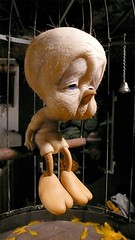January 12th, 2010 by KerriSparling in Better Health Network, Medblogger Shout Outs, Opinion, Patient Interviews
No Comments »

Quick post to the PR professionals in the healthcare sphere:
When someone dies, it is terrible tragedy. That person leaves behind a family, loved ones, and – especially when they die young – their future. If someone dies as a result of diabetes, or due to complications from diabetes, or from something else entirely but they happened to have diabetes, and you decide to exploit their death to gain pageviews for your website? (See also: Brittany Murphy, Casey Johnson)
Come on.
There’s a difference between passing on information that could help people improve their lives, and then there’s pure, TMZ-style exploitation. Read more »
*This blog post was originally published at Six Until Me.*
January 5th, 2010 by PhilBaumannRN in Better Health Network, Opinion
No Comments »


- Image by sirwiseowl via Flickr
Disclosure: I’m fascinated with Technology in general and social software and communities in particular. I’m one of Twitter’s biggest fanboys (here’s proof). I blog and tweet often about these media because I believe it’s important that we understand our relationship with Technology (and for me, Technology is more than just gadgets – for instance: I consider Law, Democracy, Religion and Capitalism technologies – but that’s another post).
I also believe that we need better or more original conversations about the Web and its deepening influences on our lives, our businesses, our sciences and our health care. Social Media pundits (or however they refer to themselves: gurus, evangelists, mavens) for too long have held the dominant voice in these discussions.
One phenomenon which our Web has engendered is the ability for virtually anyone to express their opinions and experiences and perspectives in accordance with their mastery of media. And therein lies a pesky issue: one’s accumulation of social attention for a particular field doesn’t always correlate with their expertise.
Over the last decade, many brilliant contributors have offered important and refreshing perspectives on the promises of the web. But some of these ideas have yet to be vetted and validated by closer scrutiny and scientific inquiry. The truth is not always intuitive. It’s easy, therefore, for appealing ideas to have fundamental flaws. Read more »
*This blog post was originally published at phil baumann online*
December 18th, 2009 by KevinMD in Better Health Network, Opinion
No Comments »

The advent of the internet, combined with social media, has made everyone experts and has increased the disdain for authority.
No where is that more apparent than the firestorm that surrounds vaccines and its detractors.
The Los Angeles Times’ James Rainey writes a column on the phenomenon, observing the backlash against a well-written, nuanced piece debunking the link between vaccines and autism.
But as we know, those who already believe there is a connection are unlikely to be swayed. And on the web, it’s easy to find data and studies that fits an already established mindset. Read more »
*This blog post was originally published at KevinMD.com*
December 11th, 2009 by PhilBaumannRN in Better Health Network, Interviews, Patient Interviews
1 Comment »
 Dave deBronkart is a Freedom Fighter. In 2007, Dave battled metastatic cancer and emerged a passionate advocate for leveraging the Web to connect patients with the content and support and inspiration they need to cope with the human consequences of disease.
Dave deBronkart is a Freedom Fighter. In 2007, Dave battled metastatic cancer and emerged a passionate advocate for leveraging the Web to connect patients with the content and support and inspiration they need to cope with the human consequences of disease.
The Web has brought forth new ways of connecting the world and brings with it questions and answers about how to safely and effectively extend the power of health care from face-to-face meetings to remote but important regions of human experience. It’s important for us to understand the integrative nature of health care: no single perspective will yield approaches that work. Rather, we will need the perspective of all participants. Read more »
December 8th, 2009 by Berci in Better Health Network, News, True Stories
No Comments »

 There is an interesting article in E-Health Europe about how patients try to contact doctors on Facebook, the popular social networking site, and how doctors shouldn’t respond to them. In my “Medicine and Web 2.0” university credit course, we cover this important issue several times and I try to provide students with useful pieces of advice about how to avoid such problems.
There is an interesting article in E-Health Europe about how patients try to contact doctors on Facebook, the popular social networking site, and how doctors shouldn’t respond to them. In my “Medicine and Web 2.0” university credit course, we cover this important issue several times and I try to provide students with useful pieces of advice about how to avoid such problems.
The Medical Defence Union said it was aware of a number of cases where patients have attempted to proposition doctors by sending them an unsolicited message on Facebook or similar sites.
The medical defence body said it would be “wholly inappropriate” to respond to a patient making an advance in such a way. Read more »
*This blog post was originally published at ScienceRoll*






 Dave deBronkart is a Freedom Fighter. In 2007, Dave battled metastatic cancer and emerged a passionate advocate for leveraging the Web to connect patients with the content and support and inspiration they need to cope with the human consequences of disease.
Dave deBronkart is a Freedom Fighter. In 2007, Dave battled metastatic cancer and emerged a passionate advocate for leveraging the Web to connect patients with the content and support and inspiration they need to cope with the human consequences of disease.
 There is an interesting article
There is an interesting article 









